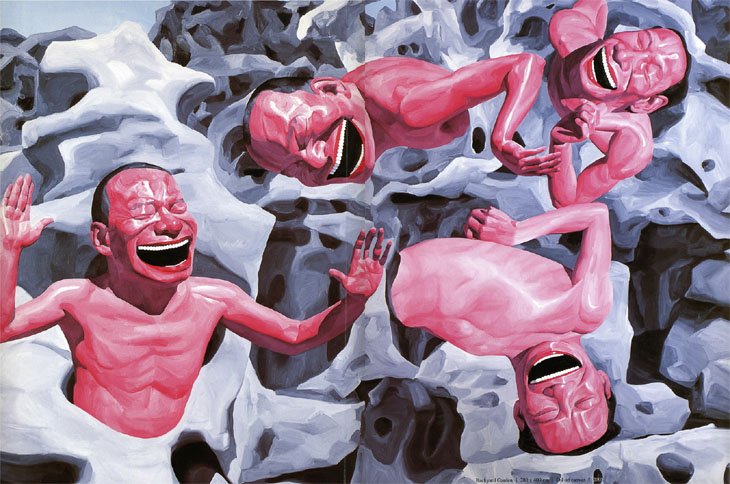The Value of Wit
by Ben Sixsmith (October 2018)

Backyard Garden, Yue Minjun, 2005
A Spectator review from the period maintained, in fact, that Knox had had too much fun at the expense of his targets: “After a time we get rather tired of the excellent bowling and the steady fall of wickets, and wish that a member of the other team would make a few runs for a change.”
. . . whatever one may say of the sixteenth-century Church in England, or of the nineteenth-century Church in America, it is quite evident that our ceremonies come down to us from times when our priests, far from deriving either dignity or profit their calling, found in ordination only a short cut to the lions.
true—this author being a sympathetic agnostic—to believe the era was unfavourable to its defenders whatever the merits of their argumentation.
Perhaps there were no merits, an atheist might respond. To know this, critics of theism would have had to have refuted its essential premises. Knox argues energetically that in this task they failed. Huxley, for example, reminds him of “the character in The Man who was Thursday who knew all about Christianity because he had read it up in Religion the Vampire and Priests of Prey.” Huxley criticised William Paley, then, whose argument from design has a peripheral place in Christian history, but somehow never touched on Thomas Aquinas. We know that new atheists have made the same the mistake, wedded as they are to scientistic argumentation. (Richard Dawkins did at least attempt to refute the Five Ways, but attacked summaries of them, not the arguments themselves.)
To be sure, there is being funny and there is being frivolous. Much of the Christian faith, the conservative tradition and, indeed, earthly affairs at large demand a seriousness that respects their human and spiritual implications. Still, there is a difference between seriousness and humourlessness. The former offers one the chance to weave rich tapestries of tone. The latter paints the world in grey.
Christians and conservatives, I think, have at times confused the two. Evelyn Waugh and Malcolm Muggeridge—among the funniest men of the Twentieth Century—became more priggish, pedantic and pompous when they discussed religion, leading to the famous, or infamous, debate where John Cleese and Michael Palin ran elegant circles around a blustering Muggeridge on the subject of their film The Life of Brian (a film which he evinced no sign of having seen). Knox enjoyed far less renown in the world of letters but his wry, witty approach was superior to theirs. One can lament and laugh at ignorance and ideology.
___________________________
Ben Sixsmith is an English writer living in Poland. He has written for Quillette, The Catholic Herald and The American Conservative, among others. His forthcoming book is Kings and Comedians: A Brief History of British-Polish Relations.
Follow NER on Twitter @NERIconoclast